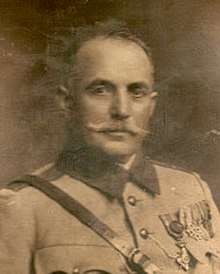Constantin Dumitrescu (general)
Constantin Dumitrescu (February 25, 1868 – January 24, 1935) was a Romanian major general.
Constantin Dumitrescu | |
|---|---|
 Dumitrescu in 1919 | |
| Born | 25 February 1868 |
| Died | 24 January 1935 (aged 66) |
| Allegiance | |
| Service/ | Army |
| Years of service | 1892–1929 |
| Rank | Major General |
| Battles/wars | World War I Hungarian–Romanian War |
| Awards | Order of the Star of Romania, Grand Officer rank Order of the Crown (Romania), Grand Officer rank Czechoslovak War Cross 1918 |
Born in Morunglav, Romanați County, his parents were Dumitrache and Nicolița Ioan; the surname Dumitrescu was adopted later. His father was possibly of Greek origin. The future general was nicknamed “Turcu” (“the Turk”) because he was intransigent and did not accept to be contradicted.[1]
In 1887, he entered the school for soldiers’ sons in Craiova, entering the officers’ school in 1890. He graduated in 1892 as a second lieutenant. The same year, he was assigned to the Rovine Regiment, serving there until 1896, when he was promoted to lieutenant. In 1897, he married Elena Dăbuleanu. His regimental service was interrupted in 1900–1901, when he was assigned to the soldiers’ sons’ school. In 1904, he became a captain, and was promoted to major in 1911, and to lieutenant colonel in early 1916.
Soon after Romania's entry into World War I he fought with bravery in September 2016 at the Battle of Turtucaia.[2] He was promoted to colonel afterward, and in 1917, he was named brigadier general.[3]
In the summer of 1919, Dumitrescu participated in the Hungarian–Romanian War, reaching Budapest.[4] Named major general in 1924, he entered the reserves in 1929.[5]
His awards include the Order of the Crown (1910, 1919, 1924, the latter of the grand officer rank), the Order of the Star of Romania (1917, 1922, 1928, the latter of the grand officer rank) and the Czechoslovak War Cross 1918 (1928).[6]
Notes
- Manolescu, p. 47-8
- Moise, Leonida (2018), "Primele acțiuni militare pe Frontul din Dobrogea. Bătălia de la Turtucaia și consecințele acesteia asupra evoluției militare de pe Frontul de Sud" (PDF), POLIS, 6 (2): 85–102, retrieved April 21, 2020
- Manolescu, p. 48
- Manolescu, p. 49
- Manolescu, p. 50
- Manolescu, p. 50-51
References
- Cornel Manolescu, “General de divizie Constantin Dumitrescu”, in Memoria Oltului și Romanaților, year V, nr. 1 (47)/January 2016, p. 47-55